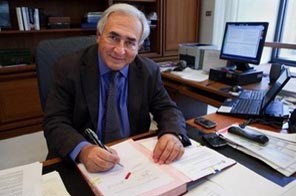IMF chief sees global recovery, urges exit strategies
BERLIN: The global economy "appears to be emerging" from a steep slump and countries should plan to wind down stimulus efforts, International Monetary Fund chief Dominique Strauss-Kahn said Friday.
"The global economy appears to be emerging at last from the worst economic downturn in our lifetimes," Strauss-Kahn said in a speech in Berlin.
The risks of the fragile recovery stalling appeared to be diminishing, as several advanced economies -- including France and Germany -- had already returned to growth and emerging economies were "recovering even more strongly," he said in prepared remarks.
But he warned that problems in the financial sector could persist or even intensify, particularly if efforts to restore banks to health are not completed.
In light of the fragility of the recovery, Strauss-Kahn cautioned there was "a real danger" countries may end their extraordinary monetary and fiscal crisis measures prematurely.
"Having said this, the time is right for policymakers to formulate their exit strategies," he added.
The former French finance minister said that international coordination of exit strategies would perhaps be even "more important" than the well-coordinated crisis response.
"Greater clarity in communicating policy intentions to the public is also essential to shore up confidence," he said.
Strauss-Kahn was due to travel to London later Friday for a two-day meeting of finance chiefs from the Group of 20 developed and developing countries in advance of a September 24-25 summit in the northeastern US city of Pittsburgh, Pennsylvania.
The global recovery, Strauss-Kahn said, would likely be "relatively sluggish," with unemployment continuing to rise through next year.
"A jobless recovery remains a risk. Having so many people out of work has significant economic costs, ranging from lower private demand to a decline in potential growth if structural unemployment rises," he said.
"The social consequences are potentially even more worrisome."
Regulatory reform momentum was lackluster, he noted, urging countries to avoid "complacency" as financial markes improve.
"The reform effort is not proceeding as quickly as is necessary to address the problems raised by the crisis," he said.
The IMF managing director addressed concerns about the international monetary system and
t the dollar's role as the world's reserve currency in the wake of the financial crisis.
Critics have noted the role of the dollar may have been "undermined" by US economic and financial troubles, he acknowledged.
"I note, however, that the US dollar actually strengthened during the crisis. In my view, this reflects the dollar's status as an unrivaled safe haven asset," said Strauss-Kahn.
Recent proposals have called for the creation of a new world reserve currency, possibly based on the IMF's composite currency, the SDR, or special drawing rights.
"Another possibility, and perhaps the least unlikely alternative, is for a multi-reserve currency system to emerge, with currencies like the euro, the yen and even the renminbi (Chinese yuan) serving as co-equal anchors," Strauss-Kahn said.
The IMF chief said the 186-nation institution could do more to support the international monetary system, suggesting its financial resources base "could be increased further."






